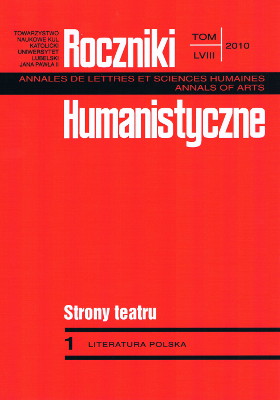In Quest of the Source of Light Some. Reflections on Roman Brandstaetter's Drama Powrót syna marnotrawnego
Abstract
Powrót syna marnotrawnego [The Return of the Prodigal Son] focuses on three different stories: the biblical story of the lost son, an event that took place in Rembrandt van Rijn, a painter from Leida, and the transformation that had undergone in Roman Brandstaetter, the author of the drama. Although the author himself constructs in his work the life of the Flemish author, on the basis of his own experiences, the drama is not only a story about concrete people. Rather, it is the experiences of particular people trying to find an answer to the question about the sense of faith and the essence of life. The key role in this text is the quest after light, both by the artist who by means of new plastic techniques seeks to comprehend reality, and the playwright who is constantly seeking his own place in the world. On the one hand light plays an essential role in the painter's work, but on the other it is a symbol of God who should be sought and found in various experiences of our life. It is important here to compare Rembrandt's and Brandstaetter's lives to the events from the Gospel of St Luke. In the way the drama is constructed, the analysis of its concrete parts, and reflection on the time described in the text the reader is brought closer to the understanding of suffering and painful transformations. They are all necessary on the way to approach nearer the source of light itself, that is God.
References
Brzezińska R., Do Itaki. Rozmowy z Romanem Brandstaetterem, „Życie imyśl” 1990, nr 3/4, s. 45-55.
Brzezińska R., Droga pod górę. Rozmowy z Romanem Brandstaetterem, „Życie i myśl” 1990, nr 11/12, s. 43-54.
Brzezińska R., Moja podróż sentymentalna. Rozmowy z Romanem Brandstaetterem, „Życie i Myśl” 1989, nr 7/8, s. 68-80.
Bugaj E., Roman Brandstaetter (1906-1944), „Przegląd Artystyczno-Literacki” 1998, nr 7-8, s. 152-159.
Frister E., Kupiec warszawski – debiut dramaturgiczny Romana Brandstaettera, [w:] Żydzi w lustrze dramatu, teatru i krytyki teatralnej, Katowice 2004, 145-159.
Góra J., Był jak przechodzień do domu Ojca, Poznań 1997.
Grzegorczyk J., Jesteś tym, kim będziesz jutro, „W drodze” 1997, nr 97, s. 66-71.
Jasińska Z., Religijne wątki w dramaturgii Brandstaettera [w:] Religijne tradycje literatury polskiej, t. II: Dramat i teatr religijny w Polsce, red. I. Sławińska, W. Kaczmarek, Lublin 1991, s. 401-417.
Kępińska P., Modlitwa Romana Brandstaettera, „W drodze” 1976, nr 9, s.102-107.
Krawiecka E., „Moim domem jest światło”. Roman Brandstaetter jako dramaturg, [wstęp w:] R. Brandstaetter, Dramaty, Kraków 2006, s. 5-15.
Kulesza D., Tragedia ukrzyżowania: dramaty chrześcijańskie Romana Brandstaettera i Jerzego Zawieyskiego, Białystok 1999.
Kuraś M. (red.), Roman Brandstaetter i Janusz Warnecki. Listy 1947-1969, Warszawa 1999.
Lichniak Z., Bliżej Brandstaettera, [wstęp w:] R. Brandstaetter. Poezje, wiersze liryczne, poematy i hymny, Warszawa 1980, s. 5-89.
Pytel J. K. (red.), Nie zapomnimy. Świadkowie życia i czytelnicy o Romanie Brandstaetterze, Poznań 2002.
Pytel J. K. (red.), Świat Biblii Romana Brandstaettera. Materiały Ogólnopolskiej Interdyscyplinarnej Sesji Naukowej, która odbyła się 20-22 października 1999 r. na Uniwersytecie im. Adama Mickiewicza w Poznaniu, Szczecin 1999.
Seul A., Jan Chrzciciel – Brat Pustynny według Romana Brandstaettera, Lublin 2004.
Szczepańska M., Jak powstał „Powrót syna marnotrawnego”?, „Dziennik Literacki” 1948, nr 5, s. 7.
Wysińska E., O dramaturgii Brandstaettera, „Dialog” 1964, nr 7, s. 98-102.
Zajączkowski R., Pisarz nieznany. O początkach drogi twórczej Romana Brandstaettera, „Poznańskie Studia Polonistyczne. Seria Literacka” 2001, s. 171-188.
Copyright (c) 2010 Roczniki Humanistyczne

This work is licensed under a Creative Commons Attribution-NonCommercial-NoDerivatives 4.0 International License.





